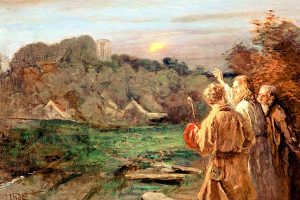Readings (Scrutiny Year A):
Ezekiel 37:12 – 14
Psalms 130:1 – 2, 3 – 4, 5 – 6, 7 – 8
Romans 8:8 – 11
John 11:1 – 45
Reflection: The power of a healing presence
Before the fall of 2022, I would have offered a different reflection for today. I could have focused on the relationship between Mary, Martha, and Jesus. Or the way the story was crafted by John. But, today, I offer a reflection grounded in the illness of Lazarus and the role of caregiving as understood through Mary and Martha.
All my life I have been an active person. I was a college athlete and am a former New Yorker who could walk for miles. However, my favorite activity in the world is chasing down my niece and nephew.
Then, abruptly, I was told I had a rare neuromuscular autoimmune disease called Myasthenia Gravis. Some of my symptoms included severe muscle weakness, slurred speech, and an inability to swallow. While relieved to learn the unexplainable symptoms were now explainable, my husband and I left the office shell-shocked. We felt disbelief, grief, and sadness. Maybe you have had a similar experience, or have accompanied a loved one in this situation. It is hard and heavy.
One year later, my suffering intensified, and I received a new diagnosis: Myalgic Encephalomyelitis, previously known as Chronic Fatigue Syndrome. Again, we went through the same cycle of emotions. But, as the “sick” one, I saw how this second diagnosis affected my caregivers, particularly my husband and my mother who are my hands and feet. They push me in my wheelchair, cook my meals, manage my infusions and medications, and when I am down, remind me of the hope of tomorrow.
But, doing that day in and day out, they experience “caregiver fatigue.” They have anxiety, their hopefulness ebbs and flows, and they grieve the life they once knew with me. As I reflect on Mary and Martha in this passage, I cannot help but imagine how the weight of Lazarus’ illness affected them.
All we know from Scripture is Lazarus was “ill.” We don’t know how long he suffered, what healers told him, or what kind of medicines he tried. We also know Jesus loved this family deeply. Mary, Martha, and Lazarus believed in who Jesus was. They did not doubt that Jesus could save Lazarus, but they could feel Lazarus’ death approaching. This must have been a very fearful and uncertain time—familiar to any caregiver today.
When I imagine this scene, God brings me back to Lazarus lying in his bed at home. I am reminded of the time I have spent ill in bed and what that experience is like. Perhaps, like me, Lazarus was happy to have visitors, but too tired to speak with them. Maybe, Lazarus could sense his sister’s frustration that Jesus was not there but didn’t know what to say. It is possible he felt the presence of others praying over him, like I have on many occasions, and it brought him consolation. And maybe Lazarus longed for Jesus himself and worried his friend wouldn’t come.
One of the corporal works of mercy is visiting the sick. A friend visited me once and said, “Knowing someone is sick is different than seeing and experiencing someone sick.” That has profoundly moved me, and I believe speaks to the way Mary, Martha, and Lazarus must have felt when Jesus did not come in time. I can imagine them saying, “Just get here Jesus! Just be here with us!” But, in Jesus’ human experience, he could not get there in time to be with his friend whom he loved. And for that he wept.
Yet, that is not the end of the story. In the face of mourning, Jesus calls out to God on behalf of the faith of the people gathered. Lazarus arises and walks out of the tomb. Lazarus’ body is restored and renewed, his caregivers astonished and relieved, and a community comes to believe that Jesus offers us new life here on earth and in the life to come.
Our invitation today is to acknowledge the power of our own healing presence. We are no Jesus, but we are a part of God’s creation. Oftentimes we think we need to do things for someone who is ill, but, in my experience, just by being with someone who is ill, you bring both God’s joy and peace.
May this Lenten season continue to be a time of reflection and growth for you and your loved ones.













Add comment